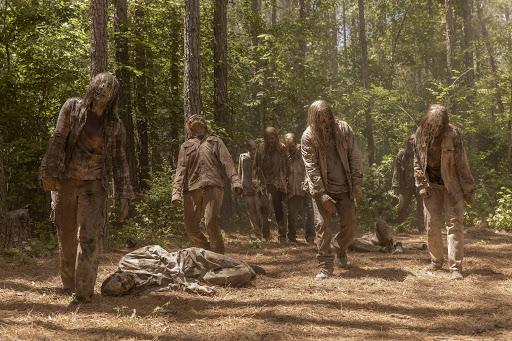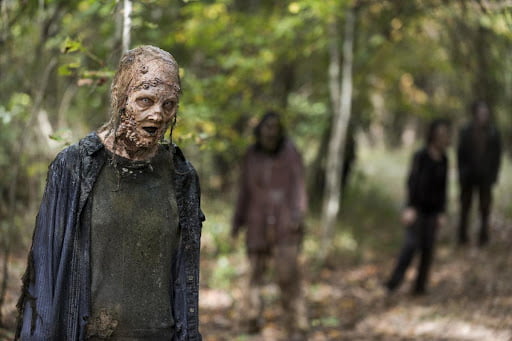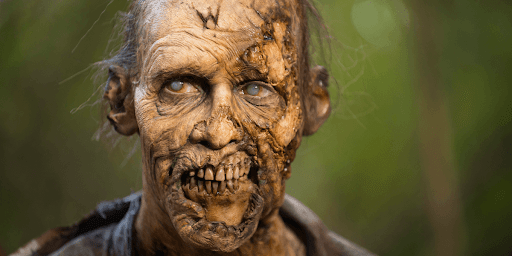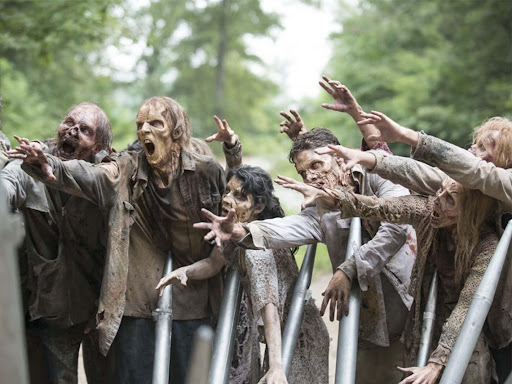Thousands of zombies shuffle endlessly and groan unintelligibly around the world. The zombie population continues to swell one after another, region after region. But this seemingly unstoppable zombie population raises a multitude of questions. Can zombies reproduce?
How does their horde sustain? And most importantly, can zombies reproduce?
Yes, they can reproduce and grow in numbers. However, from novices to aficionados, we know zombies cannot reproduce like most living beings.
Alternatively, zombies do not have the capacity, prerequisites, and essential functions to procreate or breed. Reproduction characterizes and exemplifies living beings and is a characteristic strictly associated with life. Therefore, procreation and reanimation do not meld. Zombies are incapacitated and void of such abilities and desires. But if they cannot reproduce, how do they increase their horde?
Neither they spawn nor they give birth; zombies reproduce by infecting others. These mindlessly hungry beings build on their horde by biting, injuring, and scratching living beings. Reproduction in zombies is similar to that of most microorganisms and viruses. Zombies bite or scratch a living being and transfer the virulent strain into their host.
The host, then, gets reanimated and infects others. The chain proceeds uninterruptedly and envelopes a vast area within its reach. Zombies are merely a vessel used by zombie viruses for their spread, and else, zombies do not have a way of reproducing themselves.
However, some theorists believe that desires and urges are mutated, unbidden, and unanticipated. Zombies might ‘figure out’ an approach and ‘invigorate’ their desire to procreate in known ways. The notion underscores that the grotesque undead might also need the warmth of a conventional reproductive course.
At the same time, some enthusiasts discourage the idea and find it unpalatable and provocative. They see this juxtaposition as unfit and ridiculously irrational for decaying, mindless beings.
Regarding zombies and reproduction, the responses usually range from curiosity, a shock to disgust and surprise. Theories might romanticize the idea of reproduction among zombies, but facts and rational points otherwise.
Whether zombie reproduction melds with amorousness or is it stringently the completion of the viral cycle, read on to find out. Below we have conferred on the conjectures, underlying biology, and possible behaviors involved in zombie reproduction. Stagger along!
Can zombies reproduce like humans?
Let’s start with the controller, regulator, and monitor of all the activities- the brain. From unobserved breathing to roadrunner-like running, our brain broils a finite set of neurons. It fires up specific areas to respond to actions.
Procreation, however, tops the list of humans’ most enhanced activities. From most of the brain working at its optimal to the release of several hormones simultaneously, procreation is the manifestation of human erotic attachments.

Reproduction in living beings
Copulation in humans is motivated and predominantly influenced by several hormones. Each hormone improves the drive, arousal, and human desire, from testosterone, oxytocin to estrogen and vasopressin.
To regulate and direct this enhanced activity, our brain’s activity improves exponentially. The brain areas activated during this process include the anterior cingulate cortex, hypothalamus, thalamus, and parietal cortex. These areas direct human behavior to achieve feelings of urges, desires, and rewards.
The amygdala, the part of the brain located near the hypothalamus, is responsible for indicating and alerting the changes around us. During copulation, this region generates triggers like increased blood pressure, breathing, and perspiration. Another part generating copulative responses is the nucleus accumbens.
This region is often dubbed the pleasure area of the brain. The nucleus accumbens triggers the release of the pleasure hormone dopamine during copulation.
Remember that human copulation is a seamless amalgam and faultless working of all the parts and hormones. Initially, the amygdala registers worth-noticing and critical sensory information.
Next, the parts of the brain responsible for carrying out this activity trigger the release of hormones. The copulation reaches its peak and drips down from there. The nucleus accumbens receives dopamine and develops a memory of the event throughout the process. This registered memory reinforces the desires and strengthens motivation to repeat the process.
If there were no reinforcement and memorization, erotic attachments would loosen, and procreation will fail.Every living being more or less procreates similarly. Each uses most of its brain to initiate, peak, and abort its copulative process. Living microorganisms, however, exhibit an entirely different reproduction process. Their reproduction is a more defined form of replication rather than an enhanced reproductive activity.
These micro-organisms fuse to generate a copy with the same characteristics and functions.
All in all, reproduction in living begins involves the optimal function of their processing unit (brain in animals and humans, and nucleus in micro-organisms) and the triggers to carry out these activities. The inability to trigger the motivation, catalog the reinforcement, and drive to copulate is not often found in living beings.
Therefore, copulation or reproduction in a conventional manner is typical of living beings and not of the reanimated undead ones.
Reproduction in zombies
Now, the question remains, do zombies reproduce like humans?
Let’s answer this with the basic definition of what zombies are:
“A grotesque creature that is a dead person reanimated to life but bears little to no human qualities.”
Underscore the words dead and no human qualities. Zombies lack essential human characteristics like proper gait, fluent speech, and fine-tuned responses. The sole and core reason behind not-so-human reincarnation is a poorly rewired brain.
Zombie virus might have done zombies a favor by lending them a life. But apparently, it deprived them of the needs, desires, and normalcy they experienced in their former lives. And a more significant loss, the reanimation incurred incapacitation of the copulative process and omission of any such memory.
Still, some fanatics and sympathizers imagine a copulative process for zombies. Firstly, the definition of a zombie defies and nullifies the existence of a copulative process among zombies. But let us compare and understand how zombies will utterly fail in copulating like humans or animals.
Again, let’s come back to the basics. There is no denying that zombies have a brain.
It is designed to perform specific functions and directed to respond to certain triggers (copulative drive isn’t one). Where these decaying beings excel at sensing humans, a master at hunting humans down, and outrival humans in every aspect, they cannot experience the drive to procreate. Procreation is underlain with solid urges and desires, which are generated as a response to the release of certain hormones.
Zombies do not have these hormones and chemicals.
We know how the human brain functions during copulation. Let’s understand how the zombie brain fails at doing the same.
Reanimation or rewiring is a targeted approach to tweaking and adjusting the brain. We can observe that reanimation restores essential characteristics for existence. These include the ability to move around, hunger, and prowess to feed your hunger.
Zombies exhibit all these characteristics; they shuffle around with an unquenchable thirst and relentless prowess to fend for themselves. However, procreation is also considered essential for the persistence and survival of a being.
Where reanimation restored the gait, it missed out on the essential copulative characteristics. Well, regeneration has a mind of its own. As mentioned earlier, procreation involves certain areas and several hormones to conceive the process. Unfortunately, zombies are deprived of these pivotal requisites and essentials.
Reanimation reinstates some parts of the hypothalamus, cerebellum, and cerebrum. This slight rewiring reestablishes a staggering gait and induces five senses to work at a bare minimum. It doesn’t bring back the memory and ability to address the copulative desires. The copulative process requires the brain to work at maximum capacity and directs the hormones to strengthen the process.
One of the most crucial parts that zombies lack is the hypothalamus. It is the most critical part involved in abridging the brain with the limbic system and stimulating the release of hormones. Reanimation rewires the hypothalamus and does enough to reinstate limited gait and senses. However, releasing hormones and regulating desires requires the hypothalamus to operate at its finest.
With the amygdala and nucleus accumbens switched off, procreation is defeated at its core purpose. Zombies do demonstrate desires and urges, but those aren’t motivated by hormones. They are mere outcomes of poorly connected parts of the brain and meager functionalities.
The fanatics who favor human-like zombie procreation confound two circumstances:
1) They confuse the urge and drive to consume relentlessly as hormonal.
2) They complicate reanimation as the complete reincarnation.
Undeniably, hunger and the drive to hunt are hormonal in humans, and the fact should stand actual considering zombies as reanimated humans. But this drive for need isn’t hormonal in zombies. Even if such a mindless desire were to be hormonal, it would require a brain working at a hundred percent capacity. And in a worst-case scenario, the brain might explode because of hormonal overdrive.
Secondly, reanimation cannot be complete reincarnation.
Zombies lack the refinedness and reasoning that we humans have. And this is probably in our favor. Imagine zombies with logic and critical thinking capabilities; human civilization wouldn’t last a day (or a week?).
Well, it is established that zombies neither want to nor can they procreate, so if not procreation or copulation, then what grows their horde? And if not hormonal drive, what motivates them to reproduce?
Below we have dissected the approaches and possible inspirations that get these decaying beings to grow.

How do zombies reproduce?
Human procreation is motivated by two factors: 1) The experience of the copulative process and 2) To take the human populace forward. The latter resonates more with our decaying beings. Or, to put it another way, zombies won’t be here to have fun and resurrect their desires.
When waging war and decimating civilization is the motto, desires, drive, and arousal get backburned. Come to think of it, the carnage and mass hysteria that the zombie apocalypse will unleash suggests merciless beings.
Heartless begins with one mutual motto- massive eradication. Having a good time was never on the table in the first place. Moreover, with desires and urges, the aim of eliminating human civilization will become elusive. So, we ask, how exactly do zombies reproduce?
Zombies adopted a desire-less and urge-free approach to increase their number. Zombie reproduction focuses on transferring the zombie virus from one host to another. The virus can be transmitted directly through contact or by consuming infected sources.
Once finished or moved, the zombie virus breaches the system of the host and resides in the brain. There, the virus initiates its latency period and rests till the death of the host. When the host dies, the virus rewires the brain and restores some of its functionalities.
The reanimated being becomes a walking vessel for the zombie virus and an active catalyst for transferring the virus.
According to popular opinion, the zombie can transfer the virus by two approaches, by biting someone or bruising or gouging its prey. Let’s discuss both of these ways briefly.
Through Bites
One of the popular ways that zombies transfer the virus to their host is by biting. Even with their decayed teeth and rotten gums, zombie bites can inflict deep gouges and bitemarks. Of course, a few factors underline the transfer of virulence into the host’s bloodstream. The bite-size and the bitemark depth explain the virulent strain transfer. Popularly, it is believed that slight scratches or grazing won’t result in the transfer of the virus.
For a zombie to transmit the virus, the bite has to be solid and deep enough. Say, the zombie has to chew or chomp on your skin; a slight nibble won’t result in transmission. Considering their weak teeth, zombies must hold on to your skin for a few seconds to inflict a deep wound.
Once they have pierced through your skin, the virus can pass freely through your bloodstream. The virus will initiate its latency, followed by the infection phase upon the death of its host. And hence, one more dead joins the undead horde and contributes to growing it.
Through Scratches
Another suggested yet popular way of transferring zombie viruses is by scratches and gashes. Some suggest that scratches won’t result in virus transmission. In contrast, some offer anyway that renders a wound will result in viral news.
Scratches also have to satisfy the rule of inflicting deep wounds. Again, the scars rendered by scratches must be more than a scrape. Scratches must impale or pierce through the skin to achieve the desired transmission.
There are no predetermined measurements of a scratch, but it has to penetrate through and leave an almost untreatable wound. To lend such an injury, a zombie has to come in close contact with its prey and possibly grasp it firmly.
Once the wound is inflicted, the zombie virus detours to the bloodstream of its host. The virus begins its cycle by prompting the latency period and concentrating within the brain. There, the virus rests, allowing its host to enjoy a healthy, illness-free life.
Unlike other viruses, the zombie doesn’t harm the well-being and hinders the healthy life of its host. Instead, it waits for the demise of its host to commence its infection phase. When the host dies, the virus tweaks the deceased brain to achieve specific functions and abilities. This reanimated being will experience hunger, precise and honed hunting skills, and prowess to infect others.
Biting and scratches are known and commonly observed ways zombies adapt to infect others. But the zombie fanatics still had to associate human-like procreation with zombies. Some fans believe that zombies exhibit copulative desires and urge. Also, these desires might be expressed, interpreted, and consummated in an entirely different way.
These conjectures are solely based on fantasies and do not hold any rationale to validate them. From what is known and widely accepted, zombies reproduce by biting, scratching, or adapting other ways to transfer the virus.
Conclusion
Can zombies reproduce? Indeed, they can reproduce and populate the world with their horde. Even though zombies are the grotesque reanimation of humans, they reproduce quite differently from zombies. Most living beings practice procreation to fulfill their copulative desires and increase numbers. On the other hand, zombies have no desire or drive to copulate in a way similar to most beings. These rotting beings prefer growing in numbers by merely transferring the virus from one living being to another.
While in an apocalypse, make sure that you don’t get infected. The only way zombies can grow in number is by increasing their number of hunts. Protect yourself from being a zombie meal or converting into one of them.
Move to an abandoned, mountainous, or heavily guarded area and adopt a minimalist lifestyle. If you couldn’t move to such an area, stock your house with sufficient food supplies and gather some weaponry to combat them. Place additional guards and locks on doors and windows and stay indoors.
The more you secure and protect yourself, the better it is for the future of human civilization. The zombie apocalypse might eradicate most human society, but even a handful of humans are enough to repopulate it.




